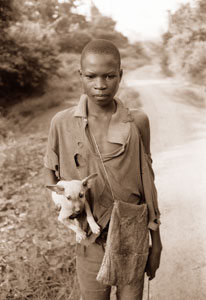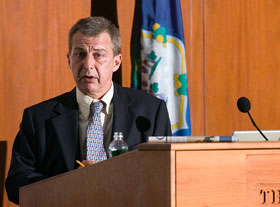  |
| HOME | THIS ISSUE | CALENDAR | GRANTS | BACK ISSUES | < BACK | NEXT > |
Photographer discusses human cost of producing cocoa by Elizabeth Omara-Otunnu - October 9, 2006 |
||||||
| The chocolate we eat shouldn't taste good, according to Robin Romano. Romano, a photographer and human rights advocate, has documented the lives of child slaves involved in cocoa production in Ivory Coast. Their suffering, he says, should give people pause when purchasing candy bars. In the words of a child slave from Ivory Coast: "Tell them, when they're eating chocolate, they're eating my flesh." Romano, whose photos were featured in a recent exhibition at the Benton Museum highlighting child labor around the world, has given the University more than 250 of his images as a tool for the study of human rights. About half-a-dozen of his photos are now part of the Museum's permanent collection. A small selection of images is on the Museum's web site. Inquiries may be addressed to the Museum. "Robin's photography brilliantly brings together the worlds of human rights education and art," says Steven Kern, director of the Benton Museum. "They are powerful images, but also exquisite photos, with a perfect balance of tonalities and negative and positive space."
The photos will complement existing human rights materials at the Museum and elsewhere on campus. Kern says he hopes to expand the Museum's focus on human rights by incorporating different media and stretching back in history to "open up new horizons of social awareness and responsibility." On Sept. 27, Romano described the plight of child slaves in the cocoa fields of Ivory Coast to an audience of faculty, staff and students in Konover Auditorium. His lecture was sponsored by Gene and Georgia Mittelman. Romano, who took photographs of child slaves during two trips to Ivory Coast during the past several years, said the problem of child labor is deeply rooted in the global economic system. "I believe in globalization and capitalism, but in its current form, globalization is grossly mismanaged," he said. "What I saw broke my heart and made me weep." He said the story of child labor in the cocoa fields involves corrupt African governments, U.S. and European governments, the World Bank, the International Monetary Fund (IMF), the World Trade Organization (WTO), and transnational organizations. "There is not a developed country that is without sin in this area," Romano said, noting that Africa has suffered from globalization. "Africa is the forgotten continent in the industrialization race," he said, adding that most African countries have poverty rates that are among the highest in the world. They are ruled by corrupt and weak leaders, dependent on primary commodities, and subject to the greed of multinationals. Throughout Africa, child labor and trafficking are on the rise, Romano said.
Slave labor has historically been a problem for the chocolate industry, he noted. About 100 years ago, for example, the British chocolate firm Cadbury was investigated for using slave labor. But the problem persists. "One million West African children are toiling in the chocolate fields," he said, "so we can have the chocolate we love so much." Romano described the global economic system that results in the use of child labor. Multinational corporations are pressured by the IMF and the World Bank to open up markets in the Third World, so developing countries can pay back their debt, he said. These countries typically rely on export commodities. Ivory Coast, which produces about 50 percent of the world's cocoa, depends on cocoa for 90 percent of its foreign exchange earnings. Once the most prosperous country in West Africa, Ivory Coast now spends five times more in debt interest than on social services. The terms of trade are unfair, he said. Multinational companies take advantage of subsidies and other trade barriers that drive wages down. For all of Africa, he said, subsidies total $1 billion, compared with $20 billion in the U.S. "How can African farmers compete with that?" he asked. Increased supply leads to decreased demand and depresses commodity prices, Romano said: "Cocoa trading today is at a 25-year low." With wages low, families in Africa have no choice but to make their children work, he said. The impact of civil war, AIDS, and cuts in spending on social services, have exacerbated the situation. Romano said many children are trafficked through bus stations, where they go to beg or look for work. Children are lured by the promise of salaries they couldn't make at home and other benefits they will never see. Once on the cocoa farms, he said, the children are overworked, underfed, abused, and often crippled. At night, they are kept hostage by guards. They face brutal treatment, even death, if they try to escape. He urged members of the audience to take a stand against child labor by raising the issue with elected officials, and buying - and encouraging others to buy - fair trade products. Fair trade sets a minimum price for commodities such as cocoa, he said, based on an amount that people in the producing countries can live on. "Fair trade is making lives better for farmers," he said, and "has the potential to be a turning point in the way the world economy works." |
| ADVANCE HOME |


